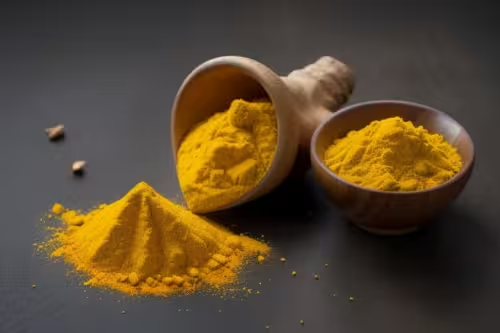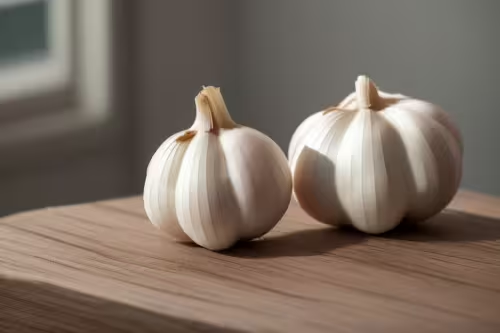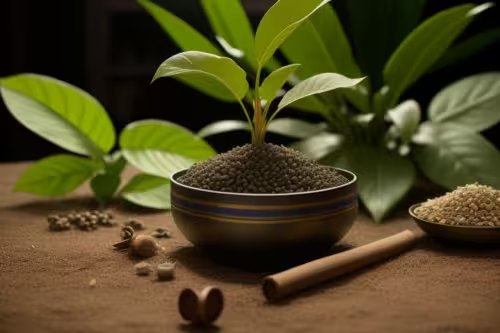5 Effective Ayurvedic Herbs for High Cholesterol Management


5 Effective Ayurvedic Herbs for high cholesterol Management
Managing high cholesterol levels is crucial for heart health. Learn how Ayurvedic herbs can naturally support heart arteries and reduce stroke risk.
Understanding high cholesterol
high cholesterol poses significant risks to heart health. When not managed properly, cholesterol, a fatty substance, accumulates in arteries, hindering blood flow and increasing the risk of heart problems.
Importance of Diet and Lifestyle
A balanced diet and healthy lifestyle play pivotal roles in managing cholesterol levels and supporting heart function. Neglecting these basics can lead to artery blockages, endangering heart health.
Ayurvedic Approach to Cholesterol Management: 5 Powerful Herbs
Ayurveda, an ancient system of medicine from India, offers holistic solutions to manage high cholesterol levels. Discover five potent Ayurvedic herbs renowned for their ability to reduce cholesterol and support heart health:
Turmeric (Haldi)

Turmeric, commonly known as haldi, is more than just a spice—it’s a versatile herb with significant benefits for heart health. The active compound in turmeric, curcumin, is celebrated for its anti-inflammatory and antioxidant properties. These properties not only reduce LDL (bad cholesterol) levels but also inhibit the buildup of plaque in arteries, thereby lowering the risk of heart disease and stroke.
Garlic (Lehsun)

Garlic, or lehsun, has been revered in Ayurveda for centuries due to its cholesterol-lowering effects. Allicin, a key component in garlic, plays a crucial role in reducing cholesterol production in the liver. Additionally, garlic prevents blood clot formation, which further reduces the risk of strokes and other cardiovascular complications.
Guggul

Guggul is derived from the resin of the Commiphora mukul tree and is well-known for its cholesterol-balancing properties. Guggulsterones, the active compounds in guggul, effectively lower LDL cholesterol and triglyceride levels while boosting HDL (good cholesterol). Moreover, guggul exhibits potent anti-inflammatory actions that promote heart and artery health, making it a valuable addition to cholesterol management regimes.
Arjuna

Arjuna, hailed as a ‘heart tonic’ in Ayurveda, supports overall cardiovascular health in multiple ways. It strengthens the heart muscles, enhances blood circulation, and helps regulate blood pressure levels. Arjuna is particularly beneficial for managing cholesterol and triglyceride levels, thereby reducing the risk of heart disease and stroke. Its comprehensive cardiovascular benefits make it a staple in Ayurvedic treatments.
Ashwagandha

Chronic stress is a significant contributor to high cholesterol and heart disease. Ashwagandha, an adaptogenic herb, helps the body manage stress more effectively. By reducing stress and anxiety levels, ashwagandha indirectly supports heart health and helps maintain healthy cholesterol levels. It also aids in improving the lipid profile by lowering LDL cholesterol and increasing HDL cholesterol, thereby promoting overall cardiovascular wellness.
Integrating Ayurvedic Herbs Safely
While these Ayurvedic herbs offer natural solutions for managing cholesterol, it’s crucial to use them under expert guidance. Consulting a healthcare provider ensures proper dosage, timing, and potential interactions with existing medications. Integrating these herbs into a balanced diet and healthy lifestyle can significantly contribute to maintaining optimal cholesterol levels and supporting heart health.
Usage and Precautions
While these herbs offer natural cholesterol management, they come with considerations. Consultation with a healthcare provider is essential before integrating them into your diet, ensuring proper dosage and timing.
Managing high cholesterol is pivotal for heart health. Incorporating Ayurvedic herbs like turmeric, garlic, guggul, arjuna, and ashwagandha into your routine, under expert guidance, can naturally support heart arteries and reduce stroke risks.
Remember, this information serves as a guide and does not replace professional medical advice. Always consult your doctor for personalized advice on managing cholesterol and maintaining heart health naturally.



